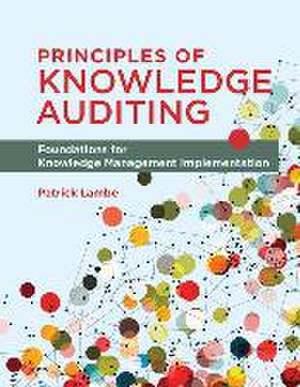Principles of Knowledge Auditing
Autor Patrick Lambeen Limba Engleză Paperback – 2 mai 2023
Preț: 363.74 lei
Nou
Puncte Express: 546
Preț estimativ în valută:
69.62€ • 75.65$ • 58.52£
69.62€ • 75.65$ • 58.52£
Carte disponibilă
Livrare economică 31 martie-14 aprilie
Livrare express 15-21 martie pentru 41.06 lei
Preluare comenzi: 021 569.72.76
Specificații
ISBN-13: 9780262545037
ISBN-10: 0262545039
Pagini: 392
Dimensiuni: 182 x 229 x 35 mm
Greutate: 0.59 kg
Editura: MIT Press Ltd
ISBN-10: 0262545039
Pagini: 392
Dimensiuni: 182 x 229 x 35 mm
Greutate: 0.59 kg
Editura: MIT Press Ltd
Notă biografică
Patrick Lambe is Principal Consultant at Straits Knowledge. He is the author of Organising Knowledge: Taxonomies, Knowledge and Organisational Effectiveness and coauthor of the award-winning The Knowledge Manager's Handbook: A Step-by-Step Guide to Embedding Effective Knowledge Management in Your Organization.
Cuprins
Introduction 1
I Recovering Our Past
1 Seeking to Understand Knowledge in Organizations 15
2 The History of Knowledge Audits 23
II Speaking Clearly about Audits
3 What is an Audit? A Definitional Approach 31
4 What Kind of Audit Is a Knowledge Audit? A Naturalistic Approach 43
5 What Are We Auditing? 63
III Drivers and Motivations
6 What Stimulated the Emergence of Knowledge-Related Audits? 77
7 Beginnings and Improvisations: Discovery Review, Inventory, and Participative Goal-Setting Audits 101
8 Authority Envy: Assessment Audits and Standards in Communication and Information Audits 127
9 The Battle for Standards in Knowledge Management 145
IV Speaking Clearly about Knowledge
10 Risky Metaphors 185
11 The Syllepsis Trap: When Choice of Language Becomes Problematic 191
12 The Language of Value: Assets and Capital 203
13 The Language of Value: Resources 227
14 Ascribing Value to Knowledge and the Implications for Influence and Control 245
15 The Inventory Audit: Auditing Knowledge Stocks 253
16 Unhelpful Dualisms: The Personal-Collective Dualism 261
17 Unhelpful Dualisms: The Tacit-Explicit Dualism 283
18 Typologies of Personal Knowledge 293
19 Typologies of Organizational Knowledge 301
20 Toward Integration: Typologies of Functional Knowledge 331
21 Conclusion: Possibilities 347
References 355
Index 393
I Recovering Our Past
1 Seeking to Understand Knowledge in Organizations 15
2 The History of Knowledge Audits 23
II Speaking Clearly about Audits
3 What is an Audit? A Definitional Approach 31
4 What Kind of Audit Is a Knowledge Audit? A Naturalistic Approach 43
5 What Are We Auditing? 63
III Drivers and Motivations
6 What Stimulated the Emergence of Knowledge-Related Audits? 77
7 Beginnings and Improvisations: Discovery Review, Inventory, and Participative Goal-Setting Audits 101
8 Authority Envy: Assessment Audits and Standards in Communication and Information Audits 127
9 The Battle for Standards in Knowledge Management 145
IV Speaking Clearly about Knowledge
10 Risky Metaphors 185
11 The Syllepsis Trap: When Choice of Language Becomes Problematic 191
12 The Language of Value: Assets and Capital 203
13 The Language of Value: Resources 227
14 Ascribing Value to Knowledge and the Implications for Influence and Control 245
15 The Inventory Audit: Auditing Knowledge Stocks 253
16 Unhelpful Dualisms: The Personal-Collective Dualism 261
17 Unhelpful Dualisms: The Tacit-Explicit Dualism 283
18 Typologies of Personal Knowledge 293
19 Typologies of Organizational Knowledge 301
20 Toward Integration: Typologies of Functional Knowledge 331
21 Conclusion: Possibilities 347
References 355
Index 393
